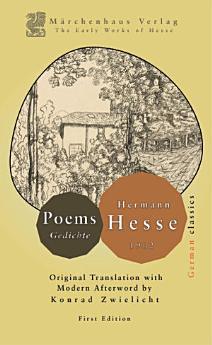Poems
The Early Works of Hermann Hesse 第 38 本图书 · Marchen Press
电子书
163
页
family_home
符合条件
info
report评分和评价未经验证 了解详情
关于此电子书
By 1902, Hesse had proven himself not only a prose writer but also a committed poet, and in that year he published a simply titled volume: Gedichte (“Poems”). Published first in Berlin by Verlag Wilhelm Grote, this collection gathered together a new selection of Hesse’s poetry, written in the years since Romantische Lieder, his first poetry collection. At the time of publication, Hesse was 24 and living a literary life between Basel and southern Germany, still honing his voice. The 1902 Poems collection was modest in appearance—likely a small hardbound book—and it did not make a sensational splash in the literary world. However, it did serve to consolidate Hesse’s reputation in German-speaking Europe as a young poet of promise. Some of these poems had appeared in journals, and now readers could see a fuller range of his verse in one volume. Notably, the collection reflects Hesse’s experiences and growth: in 1901 he had traveled to Italy, and those southern impressions can be felt in a few Italian landscapes sketched in verse. For Hesse, Gedichte was another stepping stone, quietly reinforcing his dual identity as both novelist and poet. Hesse’s second poetry collection refines the stylistic excesses of Romantic Songs while retaining their thematic core. The verses here adopt a more restrained cadence, their imagery drawn from Swabian folklore and medieval mysticism. Recurring motifs—wandering minstrels, autumnal harvests—evoke a pre-industrial Europe besieged by modernity’s encroachment. The collection’s restrained formalism reflects Hesse’s growing mastery of symbolic economy, though its emotional register remains tethered to youthful disillusionment. Critics often overlook Gedichte in favor of his novels, yet its disciplined lyricism reveals a poet honing his voice against the tumult of the early 20th century. The poems’ preoccupation with thresholds—dusk, doorways, riverbanks—prefigures Hesse’s later existential thresholds, their liminal spaces serving as analogues for psychological transformation. This new edition features a fresh, contemporary translation of Hesse's early work, making his philosophical, existentialist literature accessible to modern readers from the original Fraktur manuscripts. Enhanced by an illuminating Afterword focused on Hesse's personal and intellectual relationship with Carl Jung, a concise biography, a glossary of essential philosophical terms integral to his writings (his version of Jungian Psychological concepts) and a detailed chronology of his life and major works, this robust edition introduces the reader to the brilliance of his literature in context. It not only captures the depth and nuance of Hesse’s thought but also highlights its enduring impact on the debates of the mid-20th century, contemporary culture and Western Philosophy across the 20th century and into the 21st.
作者简介
Herman Hesse (1877-1962) navigated a life shaped by psychological turbulence that fundamentally transformed his literary vision following his pivotal encounter with Carl Jung's analytical psychology. After suffering a severe breakdown in 1916 amid his crumbling first marriage and the ravages of World War I, Hesse underwent intensive psychoanalysis with Jung's student J.B. Lang and later with Jung himself, sessions that would profoundly alter his creative trajectory. This Jungian influence became evident in his subsequent works, particularly "Demian" and "Steppenwolf," where the protagonist's journey toward individuation—Jung's concept of integrating the conscious and unconscious aspects of personality—emerges as a central theme. Hesse's correspondence with Jung continued for decades, their intellectual relationship deepening as Hesse increasingly incorporated Jungian archetypes, dream symbolism, and the notion of the shadow self into his narratives of spiritual seeking. The writer later acknowledged that Jung's therapeutic methods had not only rescued him from psychological collapse but had fundamentally reshaped his understanding of human consciousness, enabling him to transmute his personal suffering into the allegorical quests for wholeness that characterized his most enduring works.RetryClaude can make mistakes. Please double-check responses.
为此电子书评分
欢迎向我们提供反馈意见。
如何阅读
智能手机和平板电脑
笔记本电脑和台式机
您可以使用计算机的网络浏览器聆听您在 Google Play 购买的有声读物。
电子阅读器和其他设备
如果要在 Kobo 电子阅读器等电子墨水屏设备上阅读,您需要下载一个文件,并将其传输到相应设备上。若要将文件传输到受支持的电子阅读器上,请按帮助中心内的详细说明操作。











